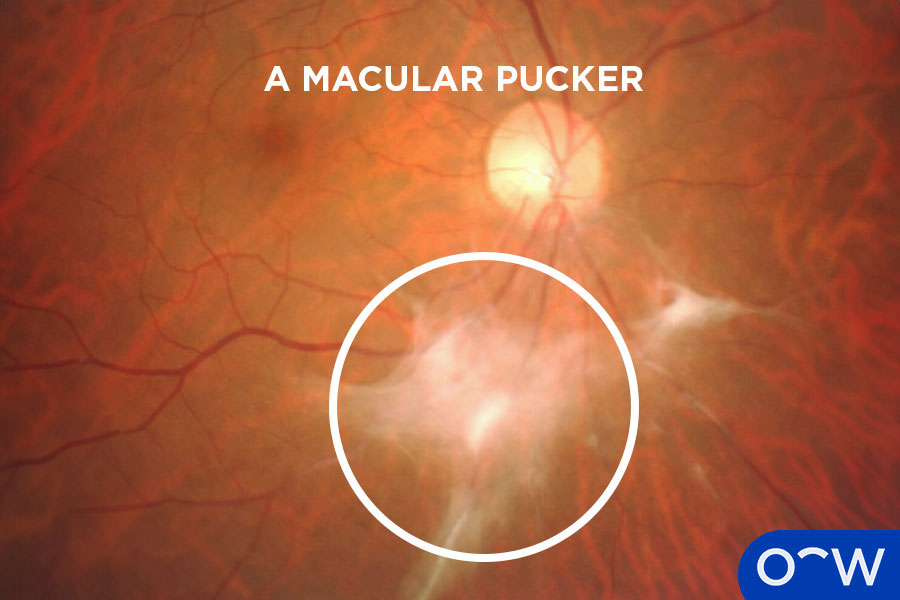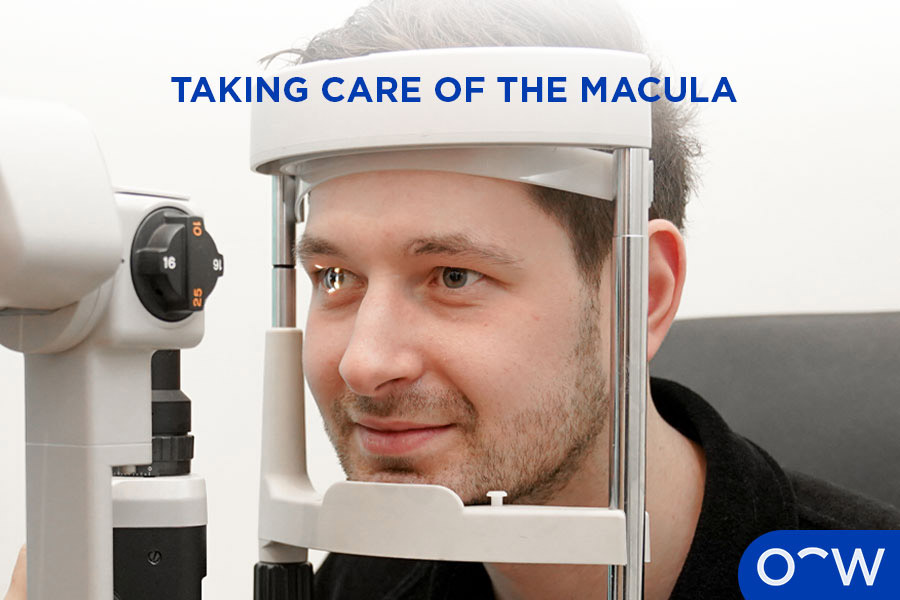Macular Pucker: Causes, Symptoms, Treatment and Care
Published on April 2nd, 2024
Macular pucker also known as an epiretinal membrane is a rare eye disorder that can cause your vision to appear wavy or distorted and occurs when wrinkles or creases develop on the macula. For the macula to function correctly, it should be in a flat position at the back of your eye, therefore, wrinkles and creases forming can impair your vision according to the American Academy of Ophthalmology. Other than the wavy appearance of vision, other symptoms may include difficulty seeing details, and a grey or cloudy area in your central vision. Treatments for macular pucker can include a type of surgery known as a vitrectomy if your symptoms are more severe. If you only have mild symptoms, you may not require treatment or you may just need to have your prescription updated as eye drops and laser surgery will not be effective according to the American Academy of Ophthalmology.
What is a Macular Pucker
A macular pucker, also known as an epiretinal membrane, is a rare eye condition that can result in wavy or distorted vision. This is due to a thin layer of tissue that develops on the retina causing wrinkling or creasing of the retina and can be referred to as a retinal wrinkle. According to the National Eye Institute, macular pucker may likely stem from normal changes to your visual anatomy as a result of ageing. The macula is a part of the retina in the eye and is responsible for your central vision.


What Causes Macular Pucker?
The causes of macular pucker can include age, retinal tears, retinal detachment, eye trauma, eye surgery and infections. The causes of macular pucker are listed below.
- Age: Age may be a primary cause of the development of macular puckers as increased age can naturally bring on both major and minor changes to the eye.
- Retinal Tears: Retinal tears can cause macular puckers, characterised as rips or splits that can develop in the retina of the eye. Increased age can also increase the risk of the eye’s vitreous gel changing in texture and size. Retinal tears can present symptoms such as floaters and light flashes.
- Retinal Detachment: Retinal detachment is an eye problem that occurs when the retina pulls away from its normal position. This means the retina pulls away from the choroid, which is what supplies the retina with oxygen and nutrients. This can cause symptoms such as flashing lights, dark floaters and blurry vision.
- Eye Trauma: Eye trauma is characterised as any injury to the eye, which can include scratches, bruises and punctures and can lead to the development of a macular pucker.
- Eye Surgery: Eye surgery can result in a macular pucker developing as a consequence of unusual inflammation that may ensue post eye surgery.
- Infections: Infections may cause macular puckers in severe cases and can stem from bacteria, viruses or fungi. Eye infections can bring on symptoms such as inflammation, redness, pain, watery eyes, eye discharge and light sensitivity.
How Serious is a Macular Pucker in Terms of Its Effect on Central Vision?
A macular pucker can be serious in terms of its effect on central vision as the scar tissue that forms on the macula can hinder the proper function of the retina. The retina is the light-sensitive tissue in the eye and helps to provide sharp central vision typically required for seeing small details, reading and driving. According to the National Eye Institute, most cases of macular puckers are considered mild and typically progress over time. There are rare cases where vision loss can occur, however, overall macular pucker is considered a rare eye condition. Regardless, it is always helpful to maintain regular eye tests with an optometrist to stay on top of any possible changes to your vision.
How Long Does It Take to Recover from Macular Pucker Surgery?
It may take 2 to 4 weeks to recover from macular pucker surgery. According to Vision Centre, you will require at least 2 to 4 weeks post-operation before resuming normal activities such as work, reading or driving. However, this range of recovery time may vary depending on factors such as your age, visual acuity and your level of activity before surgery. Full recovery from surgery on a wrinkled retina may require 3-6 months on average. You may then require another eye test to assess whether you need an updated prescription.
What are Macular Pucker Symptoms?
The symptoms of a macular pucker may include vision problems such as the wavy or distorted appearance of straight lines, blurry vision, difficulty seeing fine details and a grey spot in your central vision. This can be due to the tissue of the membrane that forms and covers the retina, which can lead to these vision problems.
When to See an Eye Doctor Regarding the Macula?
You should see your optometrist regarding the macula when you notice any changes to your vision and/or if you are 50 years or older. You may then be referred to an eye doctor, known as an ophthalmologist in Australia, for further assessment of the macula. It is highly recommended to maintain regular eye tests to prevent signs of eye conditions going unnoticed.
What are the Macular Pucker Treatments?
The macular pucker treatments are a vitrectomy and a membranectomy which are the two types of surgery for a macular pucker. A vitrectomy is where the ophthalmologist removes the vitreous body and then removes the membranes from the macula according to the National Eye Institute. During a membranectomy, the ophthalmologist will take the membrane out from the retina, which may take less than 30 minutes.
How to Take Good Care of the Macula?
To take good care of the macula, you can wear protective eyewear, eat a balanced diet and book regular eye tests. The ways to take good care of the macula are listed below.
- Wear Protective Eyewear: Wear protective eyewear such as sunglasses whenever you are out in the sun or are driving in sunny and bright conditions. This can help minimise exposure to ultraviolet light, which may damage your eyes, including your macula.
- Eat a Balanced Diet: Eat a balanced diet that consists of a sufficient portion of healthy carbohydrates, vegetables and sources of protein. This can help promote the overall health of the body and the small blood vessels in the eye, which helps supply the eye with nutrients and oxygen.
- Book Regular Eye Tests: Book regular eye tests to stay on top of any changes to your vision, which can enable the optometrist to also assess your macula.


How Does a Macular Pucker Affect Prescription for Eyeglasses?
Macular pucker may affect your prescription for eyeglasses, in that you may need a stronger prescription to improve vision. When you see an optometrist, they will be able to inform you of the required changes to your prescription glasses. However, this will depend on the severity of your condition, as glasses may only sometimes be effective in improving vision.
Can a Macular Pucker Disorder Develop in Children?
Yes, macular pucker disorder can develop in children, however, it is considered rare. According to a 2008 study on the Incidence and Clinical Characteristics of Epiretinal Membranes in Children, the occurrence of a macular pucker was found to be more common in adults 50 years and older and with certain forms of ocular diseases. While macular pucker is rare in children, this study however, highlighted the incidence of a macular pucker being more likely in boys than in girls around the mean age of 12 and in those with a visual acuity of 20/60 in the affected eye or in cases of delayed strabismus. Macular puckers are not considered a common eye problem in children, however, they can still occur.
What Happens if a Macular Pucker is Left Untreated?
If a macular pucker is left untreated, the wrinkled or creased macula may likely cause impaired vision and may result in loss of vision due to its progressive nature. However, this could take some time to ensue or may not occur at all as some cases can maintain stable vision. Nevertheless, it is important to seek professional assistance with your condition as soon as you notice symptoms of any kind.
What is the Diet for Macular Pucker?
The diet for a macular pucker may consist of foods rich in antioxidants, vitamins and other nutrients such as fish, dark green, leafy vegetables and fruits. It is important to note that this may not help prevent or treat macular pucker, however, it may still be beneficial in supporting the internal structures of your body including the eye.
Can You Live with a Macular Pucker?
Yes, you can live with a macular pucker as most cases may only cause mild symptoms and may not require treatment. According to the National Eye Institute, a macular pucker typically occurs in just one eye and progresses very slowly. However, it is important to have your condition regularly monitored to stay on top of any changes. It is also recommended to let your ophthalmologist know if symptoms start disrupting daily life.
Can a Macular Pucker Repair Itself?
No, a macular pucker cannot repair itself. The only way to remove a macular pucker is through surgery, either a vitrectomy or a membranectomy. While most cases of macular pucker do not need treatment, if symptoms make activities such as driving or reading difficult, you may require surgery. Make sure you speak with your optometrist about any changes you notice, you may then be referred to an ophthalmologist for further assessment. It is important to get a diagnosis from an optometrist first in a timely manner to prevent further complications.
Can a Macular Pucker be Treated?
Yes, a macular pucker can be treated depending on the severity. When treatment is needed, the two types of surgery that are performed are a vitrectomy or a membranectomy. A vitrectomy will require the ophthalmologist to remove a portion of the vitreous and membranes on your macula. During a membranectomy, the ophthalmologist will remove the membrane from your retina. This typically takes under 30 minutes according to the National Eye Institute.





